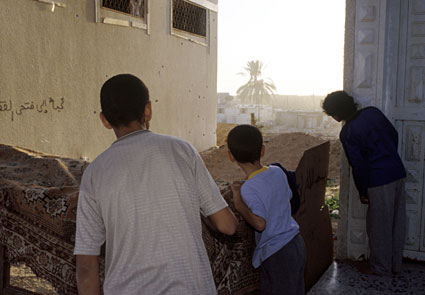
Gaza, 2002 : Children from Rafah watch a gun battle behind their homes.
Many Palestinian children are killed and wounded each year in this manner.
Photo: Darren Ell
|
 Gaza, 2002 : Children from Rafah watch a gun battle behind their homes. Many Palestinian children are killed and wounded each year in this manner. Photo: Darren Ell |
Amneh Zakkout, Khan Yunis camp, April 3:
|
|
My first few days in Gaza were spent searching for 'keys' - people whose jobs bring them in contact with large sectors of the population, people quick to understand what kind of persons a researcher is looking for. Often these 'keys' are to be found in NGOs. The Palestine disaster has led over time to the establishment not only of UNRWA but also of thousands of national and local NGOs - nowhere more than in Gaza. In my first few days I visited several sections of UNRWA, a women's project in Deir al Balagh camp, the Women's Affairs Centre, UNSCO, the WFP, the Women's Empowerment Project office, the women's section of the Gaza Police Force, and attended a panel of leading Palestinian women, organized by the Konrad Adenauer association.
In which of these places did I meet Amneh Zakkout? My notebook doesn't say. It only says that on April 3, 1998, I went to record with her in her home in Khan Yunis camp. I must have chosen her because of the number of displacements in her life, and because she had done an oral history thesis. She had been in Jordan and Libya, and had returned after Oslo to Khan Yunis. She was married to an engineer and had several children, taught in a nearby college, and helped run an NGO for children in Khan Yunis town. In her home in Khan Yunis camp Amneh was the centre of many contrasts. She looked far too young to have a student son. She was dressed in a smart two-piece, yet her home was divided into two separate sections for males and females - her husband was present during most of my visit but we neither shook hands nor spoke to each other. Born in Gaza, she had studied music in school, psychology in university (after marriage), and written a thesis on the impact of spoken stories on children. Now she was registered in Alexandria University for a PhD in child |
psychology. She expressed extreme concern for the youth of Khan Yunis, and the new post-Intifada tendency for them to form street gangs, smoke, destroy playgrounds, sleep away from home. Concern for youth is a perennial theme of Palestinian discourse but when Amneh spoke on this topic new concepts appeared such as 'psychodrama', and 'alienation'.
The poverty of the camp around us was manifest in narrow spaces and windowless walls. The Zakkout home showed little sign of financial benefits from having worked abroad. It was a spacious single room, divided into functional and male/female zones. But the windows were unglazed and the kitchen so small that it hardly had room for an old-fashioned stove. At one point our session was interrupted by a woman screaming in a nearby house. Amneh stopped speaking and buried her head in her arms, "Every day at the same time, this man beats his wife. He was a collaborator, they cut off his ears, now he beats his wife. Every day, in front of the children". She added, "I can't stand it any longer. I have to leave." Yet she also says, "We have to stay in Khan Yunis. We need to develop it. If everyone goes to Gaza (city) what will happen here?" Amneh Zakkout speaks: |
|
[Umm Abdel Jabbar 'Adwan] [Jamila 'Issa] Copyright©2005 |
|